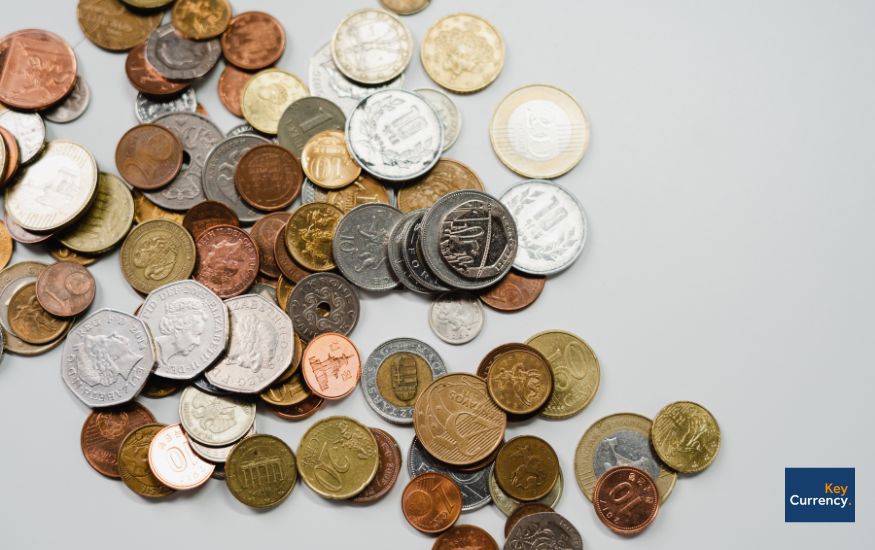 Author, Andrew Gibson
Author, Andrew Gibson
Last Updated on June 9th, 2024
The different methods a person can use to make an international money transfer continue to grow.
It can be quite a task going through all these international money transfer methods trying to find the right one for you whilst getting the best value for your money.
In this article, I’ll go through all the available methods and the different services on offer and try to make this journey a lot easier for you as a customer, answering the most relevant questions.
Various methods to transfer money internationally (how do they work?)
Let’s begin by looking at the methods available for international money transfers.
International Bank Transfers
An international bank transfer allows you to send money directly from your bank account to a recipient’s bank account in another country.
Most people sending larger sums will opt for an international bank transfer because it’s a secure and cost-effective method.
But you don’t have to use a bank to do an international bank transfer. A currency broker or an online money transfer service can also do this for you, usually at a lower cost.
Suppose you’re sending money internationally with a currency broker or online service.
Once you’ve accepted an exchange rate and confirmed the amount you wish to send, you will transfer funds from your bank account to the provider.
When received, the money transfer provider will convert your money and send the funds to your chosen foreign bank account.
Debit or Credit Card
You can send money internationally through your debit or credit card as payment.
It follows a similar process to an international bank transfer above but without requiring you to transfer funds manually to a money transfer provider, but costs more.
Once you agree on an exchange rate and amount, you will pay for the transfer with your debit or credit card.
The transfer provider will send the correct currency and amount to your recipient’s bank account.
Debit and credit cards are a convenient and quick way to transfer money internationally but come with extra costs.
Credit cards are usually more expensive than debit card payments as they take longer to process.
SWIFT Payment
If you send money to an international bank account through your bank, the process will likely use the SWIFT method.
SWIFT stands for The Society for Worldwide Interbank Financial Telecommunication.
It is a messaging system for banks and a way for banks worldwide to connect and link using standardised codes for international transfers and payments.
It’s been around since the 1970s.
The main drawback of using SWIFT for an international money transfer is the process takes longer than other methods.
Google & Apple Pay
As many do, suppose you have Google or Apple Pay set up on your devices. This method can pay for international money transfers.
Although a convenient and quick way to transfer money internationally, Google and Apple Pay have similar charges to a debit or credit card for international payments.
Selecting a credit card through Google or Apple Pay may incur higher charges than a debit card transaction.
PISP
Also known as a Payment Initiation Service Provider, PISP allows customers to instruct a money transfer service to make a bank transfer directly from their bank account on their behalf.
Customers can stay in the money transfer service app or website and not leave to open their online banking and manually transfer it themselves.
This method is one of the cheapest options and as cost-effective as a regular international bank transfer.
PISP is a new method of transferring money internationally, so not all providers or high-street banks currently support this service.

Get an International Transfer Quote
Which is the best? (convenience vs. cost)
Ultimately, customers’ main question is, ‘What is the best way to transfer money internationally?’
The answer isn’t the same for everybody!
Finding the best international method depends on the size and frequency of your requirements.
For a small one-off payment, you might favour the simplicity of a debit or credit card. But for anyone looking to transfer large sums of money abroad, the fees become more critical, which makes an international bank transfer the best option.
Exchange rate costs, in particular, can be significant on larger transfers.
So, let’s look at what are considered the best methods for both remittance and large money transfers.
Remittance
For those wanting to send £1,000 or less to an international bank account, the most significant requirement is how quickly the money transfers.
The methods known for quick transfer times are either debit and credit card transactions or the use of Google or Apple Pay.
Online-only money transfer providers such as Wise, PayPal, and Revolut, are typical services that provide the above international transactions.
These providers usually have much lower overall transfer fees for international money transfers than your high-street bank.
Usually, transfer fees with these online providers can be as little as £0.20 or as expensive as £16, depending on the destination of where your money is going.
As mentioned above, exchange rate charges will also apply, usually a % of the amount you’re looking to transfer; with lower amounts, this won’t add too much cost.
Large money transfers
Put simply, an international bank transfer is the best method for sending large amounts of money overseas.
It ticks many of the boxes that customers making a sizeable international transaction want to see.
- It is a method that can keep costs low with the right provider and much lower than online alternatives.
- It is one of the most secure and safe ways to transfer money. Customers should always make sure that the company they choose is FCA-regulated.
- It isn’t the quickest method, but also, it isn’t the slowest. Most European transfers will take between 1-3 days to complete.
Which is the cheapest? (Costs compared)
When it comes to finding the cheapest method to transfer money internationally, regardless of the way you eventually choose, the two primary considerations are:
- Transfer Fees
- Exchange Rates
The methods that apply extra charges and costs on top of the two above are:
- Debit or Credit Card Payments
- Google Pay or Apple Pay
The most cost-effective method to transfer money internationally is an international bank transfer.
However, this is only the case if you choose the right provider and don’t use your bank.
Why?
Well, most high-street banks will charge much larger transfer fees for customers for international money transfers.
Compare this to a currency broker or online service for an international bank transfer; you will find providers with no transfer fees.
The only cost you’ll have to consider is the exchange rate %.
International Transfer Method Costs
| Transfer Method | Transfer Fees | Exchange Rate Charge | Extra Costs? |
| International Bank Transfer | No (depending on the transfer service chosen) | Yes | No |
| Google/Apple Pay | Yes | Yes | Yes |
| Debit/Credit Card Payment | Yes | Yes | Yes |
| SWIFT | No (depending on the service chosen) | Yes | No |
| PISP | No (depending on the transfer service chosen) | Yes | No |

Research is vital for the best money transfer
As this article suggests, finding the best and cheapest transfer method is all about meeting your needs and researching to compare and find exemplary service.
The number of different considerations to think about can begin to mount; in terms of a priority checklist, we’d recommend researching into:
- Compare service transfer fees
- Compare exchange rates (who is offering the best?)
- Talk to a currency broker for advice and support on exchange rates
- Ask: ‘Which method most satisfies my requirements?’
- If you use your bank, read through the small print for the change of any hidden costs.
Online Exchange Rates can be misleading
A significant part of the international money transfer process is the exchange rate and finding the best one at that time.
The better the rate you find, the better the value for your money.
With so many offerings online, customers will compare the rates they see immediately.
Doing this is a mistake.
The rates you see first, on comparison sites, or by looking directly on services websites are NOT customer rates.
They are mid-market rates. Usually, services have a warning or greyed wording near the rate to alert customers.
But people can still miss it.
When comparing customer rates, it is essential to get actual quotes sent to you by providers via a call or email and compare those figures.
By doing the above, you will get the best comparison.

International Money Transfers with No Fees
International money transfer providers (what’s the difference?)
Three primary money transfer services commonly provide various ways to send money abroad.
These are:
- Banks
- Currency Brokers
- Online Money Transfer Services
All 3 have their pros and cons. Again, your choice of provider will dramatically change the overall cost and support you receive during the transfer process.
| Money Transfer Provider | Pros | Cons |
| Bank |
|
|
| Currency Broker |
|
|
| Online Money Transfer Services |
|
|
Quick Summary
- Multiple methods are available to transfer money internationally, including International Bank Transfers, SWIFT payments, PISP, Debit or Credit card payments & Google or Apple Pay.
- The best method for you will depend on your specific money transfer needs and the amount you’re sending abroad.
- The quickest international money transfer method is usually by debit or credit card payment.
- The most cost-effective method is an international bank transfer through a currency broker or online money service.
- Always compare customer exchange rates from quotes provided directly to you by the money transfer providers.
At Key Currency, we help thousands of customers in the UK and abroad every year with their international money transfers worldwide. We know a thing or two about the various methods available and which one will suit you. We can also convert between 20+ different currencies. With competitive exchange rates and no transfer fees added, we provide a money transfer service that is one of the most cost-effective available. Our Trustpilot rating is ‘Excellent’ from over 2,500 customer reviews. Unlike most money transfer services, we provide you with personal assistance. You will have an expert trader who can support you throughout the process with the following: Contact us today and request a customer exchange rate entirely for free so that we can help you with your upcoming international money transfers!

More money transfer guidance…


